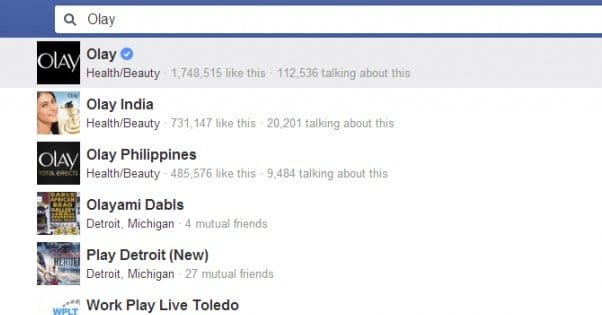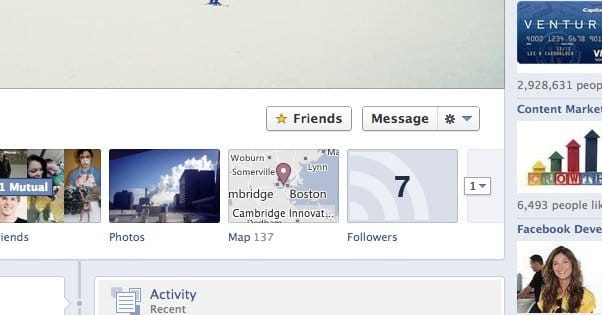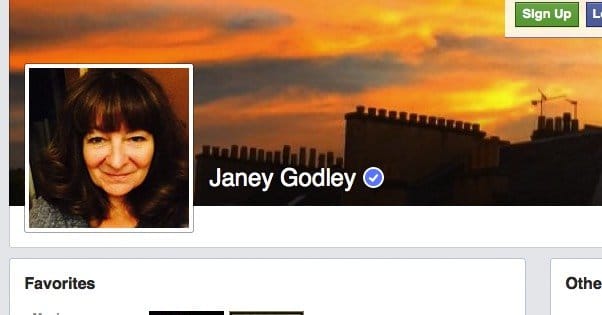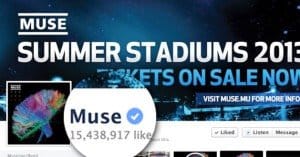 Written by ContentPowered.com
Written by ContentPowered.com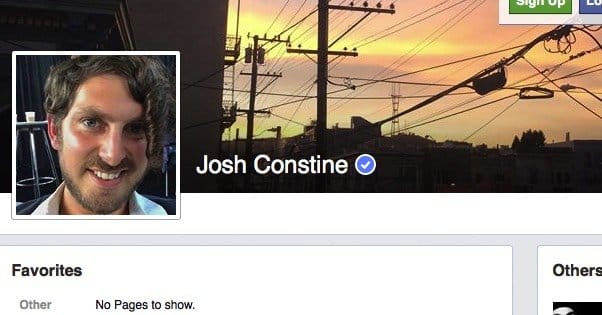
Nine times out of ten, when you read about getting a “verified profile or page” it’s that second bit that is most meaningful. Almost everyone who talks about verification is doing it to talk to businesses, from a marketing perspective. We have too; there’s a few posts about verifying pages on this very blog. Today, though, I’m going to talk about the other half; verifying profiles.
Verifying a personal profile is a very different beast, and yet it doesn’t seem that way. All of the criteria, all of the steps and methods involved, are more or less the same. Yet so many people don’t know profiles can even be verified. It’s understandable, of course. Who might you think would get a verified profile? Actors, high profile writers, those sorts of accounts, right?
- George Takei is one of the highest profile public figures on Facebook with nearly nine million likes, and he posts constantly. His posts get thousands or tens of thousands of likes and shares, and often thousands of comments. His account is also a verified Page, not a profile.
- Joss Whedon isn’t verified, but that’s because he doesn’t have a representative account. Instead, he has one of Facebook’s aggregated informational pages, which is really just data from Wikipedia scraped, reformatted, and laced with Facebook links.
- Virtually every other high profile public figure you can name falls into one of those two categories. Either they have no account and their search results bring up an informational page, or they have a Page account and have it verified.
If you hover over the blue checkmark on an account, it will tell you whether it’s a verified Page or a verified Profile. You can also tell by clicking the About tab; if it has a big “Page Info” heading, it’s a Page, not a Profile.
There are verified profiles, though. They definitely do exist. Take, for example, this guy. This guy is Josh Constine, a writer for TechCrunch, and he happens to have a verified Profile rather than a verified Page.
The Benefits of Verification
What is this verification thing all about? What does it get you, what do you need to get it, and how can you get it? There’s a lot of information about the subject but, again, it seems everyone only writes about businesses getting verified. No one seems to care about individuals.
I’ll say one thing first. If you as an individual want to be verified, you might want to consider making a Page for yourself as a public figure first and getting that page verified rather than verifying your profile. There are some benefits to this. There are also some drawbacks, though, so it might not be the best idea.
The primary benefits are access to all of the features pages get that profiles do not. Analytics through Facebook Insights are a big one. They allow you to see a lot of information about your audience, which you can use to better build your own personal brand.
Another great advantage is access to the ads system, if you’re into that kind of thing. I can only assume, however, that you aren’t. If you’re looking to verify a personal profile, you probably have other things on your mind, and you’re not looking to spend money to run ads for any particular part of your branding.
In fact, many people who run verified personal profiles are just using it because they’re a big name in journalism. Most public figures who care about personal branding use Pages, while most writers who want to be recognized but don’t run their own sites use profiles.
That is, in fact, the primary drawback with using a page instead of a profile; it’s a whole second system to manage. You have to have a profile to have a page, so you’re running both at the same time, and it can very quickly become a lot of work. The fact is, most people who want verified profiles don’t have the need for most of the features of pages.
So what about the benefits of being verified? Frankly, on Facebook, there aren’t many. All you really get is the verification checkmark, and the inherent value that comes with it. You don’t suddenly gain access to verified-users-only sub-communities or anything. There aren’t any additional systems that open up for you. All it is, is social verification that you are who you say you are.
This can in fact be a double-edged sword sometimes. Many public figures aren’t necessarily known for their ability to maintain tact constantly, so you’re always hearing about some snafu or another with someone saying something they shouldn’t. Without verification you at least have some minor element of deniability. With verification, you can’t claim someone impersonated you to slander you.
Really, the only tangible benefit of verification is having the checkmark appear in Facebook search. This means if someone is searching for you and you happen to have a common name, they won’t have to guess which person with that name is the person they’re looking for. It helps you grow.
What it Takes to be Verified
So, what do you need to be verified as a profile? Unfortunately, the requirements aren’t very clear.
For pages, you need to have a sizable audience, though the specific size is up for debate. I’ve seen pages verified with under 1,000 followers, but I’ve also seen pages not earn verification while they have half a million followers. It’s a fickle process.
Facebook doesn’t provide much information on this front, and with good reason. It’s a subjective, case by case determination. They look at who you are, they look at your account and your web presence, and they decide if you’re worth verifying.
There are a few things you can do to increase your chances of earning verification, but I’ll cover those in a later section. For now, just rest assured that if you don’t earn it, it’s not because you’re doing anything wrong. It’s just because whoever Facebook has on verification duty that day didn’t feel like you were worth it. You’ll always be able to try again another time. Or, rather, you’re always eligible.
If I had to guess what it takes to be verified, the most important factor is your position in the broader internet community. If you have a million followers on Facebook you might be pretty important, but if you don’t have a presence anywhere else online, Facebook might not care. Meanwhile, if you’re a journalist for NBC but you only have 5,000 followers on Facebook, you’re important enough outside of Facebook to be verified.
How to Verify a Profile
If you were asking about a page, this would be an easy question to answer. Directly from Facebook’s verification page, they have criteria and a process laid out. Here’s the relevant passage:
- “Right now, we’re only accepting verification requests from Pages that represent celebrities, public figures, sports teams, media and entertainment.”
If you’re running a page and you don’t fall into that criteria, you’re out of luck. If you don’t have a page, you’re also out of luck. You can try clicking here if you don’t believe me. That link leads to the official verification submission form, and it will tell you if you have an eligible page to submit. It only counts pages, so it doesn’t apply to profiles.
How do profiles get verified? There are two ways. The first is Facebook’s fly-by verification. At any point they might notice that you’re a high profile public figure using a profile rather than a page, and to prevent the issues that can come up with that, they verify your profile. Well, they don’t verify you straight off; they send you a message and ask you to submit some documents and they will verify you if they check out.
The documents they ask for tend to be proof of identity. A drivers license, a birth certificate, a passport; these sorts of documents work. If you’re not keen on sending these scans to Facebook, you just have to subsist without verification. You can always ask them about alternate means, though I’m not aware of anyone who has done so successfully.
Note: there is a similar form that allows you to choose between profile and page, and asks you to put in your name if you’re verifying a profile. You can see it here. However, I pulled this link from a fairly old blog post and I was surprised it still existed. It’s possible that it doesn’t work, or that any request you send to it will be rejected. You can try it if you like, but I wouldn’t count on it working.
You can also try contacting Facebook through their help system. Sometimes all you need to do is get your foot in the door, so to speak, and even if the person who answers doesn’t have the power to verify an account, they might be able to forward your request to someone who does.
Increasing the Chances of Verification
So, assuming the only way to get a verification from Facebook is to wait until they notice you, what can you do to increase the chances of that happening? I have a bunch of tips, though some of them will have counter-examples. They certainly can’t hurt, though.
The first thing you can do is work to increase your follower count. Followers are distinct from friends, although friends are followers by default. Essentially, a follower can subscribe to your feed without needing to have the mutual relationship of a friend link. This is a very good thing if you’re running a profile, because you definitely don’t want thousands of friends clogging up your feed with a ton of personal information and lunch pictures you don’t want to see.
Encourage people to follow your account, but do not accept friend requests unless they come from actual personal friends, family, or high profile influencers. Essentially, only friend people whose posts you want to see. Anyone who is a general fan of yours should follow your profile instead. They can do this by clicking the follow button, which appears on the cover photo with a little RSS-looking icon. Once you have enough followers, an additional box will appear beneath the cover photo but above the about box and timeline, with a follower count, icons of some followers, and a green follow button that stands out more. I think the threshold for this box to appear is around 1,000, but don’t quote me on that.
Now for a counter-example. You don’t need hundreds of thousands of followers to be verified. Janey Godley here is a comedy writer for the BBC and is verified, while she only has 2,000 followers.
The second thing you can do – and really should do regardless of whether or not you’re seeking verification – is fill out your profile as completely as possible. This means including your job title and place of employment, your educational history, your places of residence, your contact information, your personal bio, and of course your profile picture and cover photo. This guy is a good example of the information you can include in each of these sections. He’s Alexander Howard, senior tech editor at the Huffington Post.
Of course, I have a counter-example here too. Dustin Curtis is a prolific but quirky founder of Svbtle, an ad-free and simple blog platform. His Facebook profile is verified, but it has pretty much nothing going for it. He has nearly 90,000 followers, but he has no personal profile picture or cover photo – just red iconography at this point – no workplaces, very little contact info, and virtually no details. He seems to have obtained verification on the back of his off-site popularity and his follower count alone.
Really, the biggest factor I can find in getting verified is having high profile public employment. Being a journalist for a big site like TechCrunch, VentureBeat, or the BBC is almost a sure thing. Being a high profile entrepreneur also works, like Dustin Curtis, though most entrepreneurs tend to make pages because they’re data nerds. CEOs can get verification if they have pages that are active.
Activity is another big thing. If you don’t use Facebook very much, you aren’t going to be verified, because Facebook doesn’t really care about people who don’t use their site. Posting once or twice a day is plenty, but they need to be public posts and they need to be relevant in some way to being a public figure. You’re not going to get verification based on pictures of your cats, not unless you’re the owner of Cat Fancy.
I also recommend adding in milestones or life events. You can see this in action with Josh Constine’s page, the one I linked way at the start. He uses milestones to note down when he’s promoted, and writes a little blurb about the event. Milestones give more depth and detail to your page, and tell Facebook you’re there to stay, and that you’re really invested in using the page.
There are a few things that just plain don’t help. Some advice that applies to business pages doesn’t apply to personal profiles. For example:
- You don’t need to have a professional personal website linked on your profile. Most of the verified profiles I’ve linked above don’t have websites of their own, they just contribute to large multi-author websites.
- You don’t need to pay Facebook in any way. Some people recommend having an ads account on the side and plugging payment information into it, but I don’t think it will actually get you verified any faster. It will just streamline the process if Facebook does want to verify you, because they already have some personal information on file.
- Some people also recommend having a business page and getting that verified, which will in turn verify your personal profile. This works, if you have a page, but if you don’t it’s not worth the effort. It takes a ton of work to make and grow a page to the point of verification, and you can just put that work into your profile and career growth instead.
Finally, there’s one “back door” route to verification that you can use if the case arises, but you can’t put into action yourself. One of the primary purposes of verification is to let users know you are who you say you are. Therefore, if you have an imitator using your name, information, and photos to imitate you and post things you wouldn’t post, you can initiate the process.
I don’t, in this case, mean initiating the process of verification. Instead, what I mean is reporting the fake account and getting it removed. In many cases, this will just get the offending account removed, but if you have had several impersonators or you’re a high profile public figure, Facebook can decide to verify you to help prevent the problem in the future.
In the end, it’s all down to Facebook and the whims of giants. Strive to be as important and as public as you can, use Facebook to the fullest extent you can for both personal and career uses, and hope Facebook takes notice.
